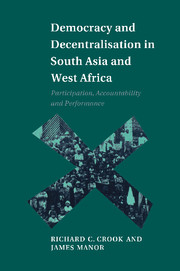Conclusions
Published online by Cambridge University Press: 12 October 2018
Summary
The principal purpose of our investigations into democratic decentralisation in four different countries was to establish whether any relationship could be discerned between enhancements in popular participation, which occurred everywhere, and changes in the performance of governmental institutions. This naturally raises a larger question: if our data show differences in performance among different authorities in the same countries or among different forms of decentralised government in the four countries, how can they be explained? The differences among the decentralised authorities within each country have been discussed in Chapters 2, 3, 4 and 5. Here we summarise our findings on participation and performance for each country and then compare the patterns or configuration of factors associated with the various performance outcomes. With such a limited number of cases it is clearly not posssible to draw any statistical inferences. The purpose of the comparison is to establish whether there is any particular combination of variables associated with a particular outcome. We conclude by discussing the significance of these four experiences of democratic decentralisation for our understanding of the relationships between enhanced participation and decentralisation on the one hand, and institutional performance and good governance on the other.
ASSESSING PARTICIPATION
In all four countries popular participation was considerably enhanced. Table 6.1 summarises the data on electoral and non-electoral participation, using turnout figures and selected indicators from the mass surveys which were found to be most significant. Of particular interest are the levels of electoral participation which, compared to the turnout for local elections typical of Britain and the USA, were remarkably high. ‘ Even the rather low national figure of 35 per cent for Côte d'Ivoire concealed a very large difference between the big cities and the majority of rural communes in which the average turnout was 51.3 per cent, while in the four case studies the turnout in the 1990 multi-party elections ranged from 47 per cent to 70 per cent. Such rates of participation are strong evidence of the popular interest and enthusiasm which these reformed local government institutions aroused among local people, both when they were first inaugurated and in those circumstances when a second set of elections allowed the electorate to express their opinion of the first administration of elected politicians.
- Type
- Chapter
- Information
- Democracy and Decentralisation in South Asia and West Africa , pp. 271 - 304Publisher: Cambridge University PressPrint publication year: 1998



